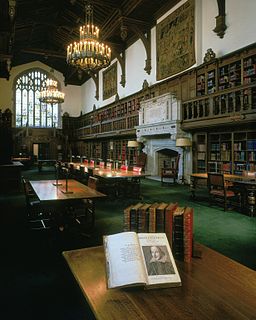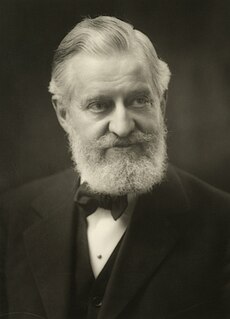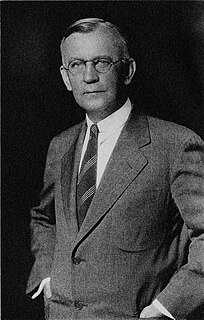Related Research Articles

The Folger Shakespeare Library is an independent research library on Capitol Hill in Washington, D.C., United States. It has the world's largest collection of the printed works of William Shakespeare, and is a primary repository for rare materials from the early modern period (1500–1750). The library was established by Henry Clay Folger in association with his wife, Emily Jordan Folger. It opened in 1932, two years after his death.

Irvin Leigh Matus was an independent scholar, autodidact, and author. He is best known as an authority on Shakespeare, but also wrote about aspects of Brooklyn's history such as the Vitagraph Studios, and developed a method of modelling baseball statistics. He was a scholar-in-residence at Shepherd University for the academic year 1992-1993. He was based in Washington, DC.

Henry Clay Folger Jr. was president and later chairman of Standard Oil of New York, a collector of Shakespeareana, and founder of the Folger Shakespeare Library.

Mr. William Shakespeare's Comedies, Histories, & Tragedies is a collection of plays by William Shakespeare, commonly referred to by modern scholars as the First Folio, published in 1623, about seven years after Shakespeare's death. It is considered one of the most influential books ever published.

Andrew Cecil Bradley, was an English literary scholar, best remembered for his work on Shakespeare.

The Hinman collator, an early optical collator, was an opto-mechanical device for comparing pairs of documents for differences in the text. Documents that appeared similar were said to “collate”. The collator resulted in rapid advances in the study of literary works.

A museum is distinguished by a collection of often unique objects that forms the core of its activities for exhibitions, education, research, etc. This differentiates it from an archive or library, where the contents may be more paper-based, replaceable and less exhibition oriented, or a private collection of art formed by an individual, family or institution that may grant no public access. A museum normally has a collecting policy for new acquisitions, so only objects in certain categories and of a certain quality are accepted into the collection. The process by which an object is formally included in the collection is called accessioning and each object is given a unique accession number.

Cyril Walter Hodges was an English artist and writer best known for illustrating children's books and for helping to recreate Elizabethan theatre. He won the annual Greenaway Medal for British children's book illustration in 1964.

Hamnet Shakespeare was the only son of William Shakespeare and Anne Hathaway, and the fraternal twin of Judith Shakespeare. He died at the age of 11. Some Shakespearean scholars speculate on the relationship between Hamnet and his father's later play Hamlet, as well as on possible connections between Hamnet's death and the writing of King John, Romeo and Juliet, Julius Caesar, and Twelfth Night.

Joseph Quincy Adams Jr. was a prominent Shakespeare scholar and the first officially appointed director of the Folger Shakespeare Library in Washington, D.C.

In library and archival science, preservation is a set of activities aimed at prolonging the life of a record, book, or object while making as few changes as possible. Preservation activities vary widely and may include monitoring the condition of items, maintaining the temperature and humidity in collection storage areas, writing a plan in case of emergencies, digitizing items, writing relevant metadata, and increasing accessibility. Preservation, in this definition, is practiced in a library or an archive by a librarian, archivist, or other professional when they perceive a record is in need of care.
The Brittle Books Program is an initiative carried out by the National Endowment for the Humanities at the request of the United States Congress. The initiative began officially between 1988 and 1989 with the intention to involve the eventual microfilming of over 3 million endangered volumes.
The conservation and restoration of illuminated manuscripts is the care and treatment of illuminated manuscripts which have cultural and historical significance so that they may be viewed, read, and studied now and in the future. It is a specialty case of the conservation and restoration of parchment within the field of conservation and restoration of books, manuscripts, documents and ephemera.

Quarto is a book or pamphlet produced from full sheets printed with eight pages of text, four to a side, then folded twice to produce four leaves. The leaves are then trimmed along the folds to produce eight book pages. Each printed page presents as one-fourth size of the full sheet.
An inventory is the one method that libraries and archives use to determine whether some items in their collection are in need of preservation or conservation activities. A modern inventory might involve examining item by item with a barcode scanner and a laptop, with the objective of adjusting bibliographic and item records in theirs and OCLC's WorldCat databases. Using a laptop and handheld bar code reader will "reduce human error and inconsistencies, while helping to maintain staff concentration and enthusiasm for the project".
Paper splitting is a method of preserving brittle papers often found in library and archival materials. In this process the front and back of a sheet of paper are split apart. A piece of acid-free paper is placed between these two sides of an acidic sheet before the pages are reconnected. The intention is to reduce the acid deterioration in the paper. A paper-splitting machine has been developed, but is not in wide use.

The Ashbourne portrait is one of the numberless portraits that have been falsely identified as portrayals of William Shakespeare. At least 60 such works had been offered for sale to the National Portrait Gallery in the 19th century within the first forty years of its existence; the Ashbourne portrait was one of these. The portrait is now a part of the collection of the Folger Shakespeare Library in Washington, DC.
Ensemble librarianship is an area of music librarianship which specializes in serving the needs of musical ensembles, including symphony and chamber orchestras, opera houses, ballet companies, wind ensembles and educational institutions. Ensemble librarians acquire printed music and prepare it for performance.

The Macro Manuscript is a collection of three 15th-century English morality plays, known as the "Macro plays" or "Macro moralities": Mankind, The Castle of Perseverance, and Wisdom. So named for its 18th-century owner Reverend Cox Macro (1683–1767), the manuscript contains the earliest complete examples of English morality plays. A stage plan attached to The Castle of Perseverance is also the earliest known staging diagram in England. The manuscript is the only source for The Castle of Perseverance and Mankind and the only complete source for Wisdom. The Macro Manuscript is a part of the collection at the Folger Shakespeare Library in Washington, D.C.. For centuries, scholars have studied the Macro Manuscript for insights into medieval drama. As Clifford Davidson writes in Visualizing the Moral Life, "in spite of the fact that the plays in the manuscript are neither written by a single scribe nor even attributed to a single date, they collectively provide our most important source for understanding the fifteenth century English morality play."
A Collections Management System (CMS), sometimes called a Collections Information System, is software used by the collections staff of a collecting institution or by individual private collectors and collecting hobbyists or enthusiasts. Collecting institutions are primarily museums and archives and cover a very broad range from huge, international institutions, to very small or niche-specialty institutions such as local historical museums and preservation societies. Secondarily, libraries and galleries are also collecting institutions. Collections Management Systems (CMSs) allow individuals or collecting institutions to organize, control, and manage their collections' objects by “tracking all information related to and about” those objects. In larger institutions, the CMS may be used by collections staff such as registrars, collections managers, and curators to record information such as object locations, provenance, curatorial information, conservation reports, professional appraisals, and exhibition histories. All of this recorded information is then also accessed and used by other institutional departments such as “education, membership, accounting, and administration."
References
- ↑ "Leafcasting - Folgerpedia".
- ↑ Bansa, Helmut & Ishii, Risuko. “The Effect of Different Strengthening Methods on Different Kinds of Paper,” Restaurator (1997): 51-72.
- ↑ "Computerized Leafcasting for a Polish Herbal-Folger Shakespeare Library".